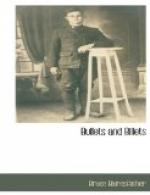“BRUCE BAIRNSFATHER.
MACHINE GUNS REMOVED AT SHORTEST NOTICE.
ATTACKS QUOTED FOR.”
And so the long dark dreary nights went on. The men garrisoning the little cracked-up village lived mostly in cellars. Often on my rounds, during a rainy, windy, mournful night, I would look into a cellar and see a congested mass of men playing cards by the light of a candle stuck on a tin lid. A favourite form of illumination I came across was a lamp made out of an empty tobacco tin, rifle oil for the illuminant, and a bit of a shirt for a wick!
People who read all these yarns of mine, and who have known the war in later days, will say, “Ah, how very different it was then to now.” In my last experiences in the war I have watched the enormous changes creeping in. They began about July, 1915. My experiences since that date were very interesting; but I found that much of the romance had left the trenches. The old days, from the beginning to July, 1915, were all so delightfully precarious and primitive. Amateurish trenches and rough and ready life, which to my mind gave this war what it sadly needs—a touch of romance.
Way back there, in about January, 1915, our soldiers had a perfectly unique test of human endurance against appalling climatic conditions. They lived in a vast bog, without being able to utilize modern contrivances for making the tight against adverse conditions anything like an equal contest. And yet I wouldn’t have missed that time for anything, and I’m sure they wouldn’t either.
Those who have not actually had to experience it, or have not had the opportunity to see what our men “stuck out” in those days, will never fully grasp the reality.
One night a company commander came to me in the village and told me he had got a bit of trench under his control which was altogether impossible to hold, and he wanted me to come along with him to look at it, and see if I could do anything in the way of holding the position by machine guns. His idea was that possibly a gun might be fixed in such a place behind so as to cover the frontage occupied by this trench. I came along with him to have a look and see what could be done. He and I went up the rain-soaked village street and out on to the field beyond. It was as dark as pitch, and about 11 p.m. Occasional shots cracked out of the darkness ahead from the German trenches, and I remember one in particular that woke us up a bit. A kind of derelict road-roller stood at one side of the field, and as we passed this, walking pretty close together, a bullet whizzed between us. I don’t know which head it was nearest to, but it was quite near enough for both of us. We went on across the field for about two hundred yards, out towards a pile of ruins which had once been a barn, and which stood between our lines and the Germans.




